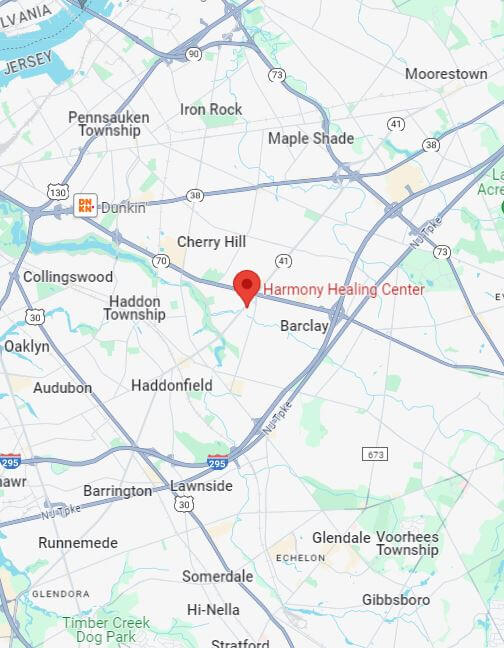Bipolar disorder is a complex mental health condition characterized by significant, often dramatic, shifts in mood, energy, activity levels, and concentration. These profound “mood swings” go far beyond typical emotional ups and downs, ranging from periods of intense elation or irritability (mania/hypomania) to deep sadness and hopelessness (depression). For individuals and families in Cherry Hill, New Jersey, and across the South Jersey region, navigating the unpredictable nature of bipolar disorder can be incredibly challenging, impacting every aspect of life.
At Harmony Healing Center in Cherry Hill, NJ, we understand the profound impact bipolar disorder can have. We are dedicated to providing compassionate, evidence-based, and specialized treatment that helps adults (18+) achieve lasting mood stability, regulate emotions, and rebuild daily life. Our focus is on both acute stabilization during challenging episodes and developing long-term management strategies, offering a safe, structured environment where healing and sustained recovery are not just possibilities, but realities.
We serve individuals struggling with moderate to severe symptoms of Bipolar I, Bipolar II, or related affective disorders.
Free Confidential Assessment Call:
Specialized Care for Bipolar I and II at Harmony Healing Center
Living with bipolar disorder presents unique challenges that require specialized understanding and tailored treatment. It’s crucial to recognize that bipolar conditions are far more complex than simple “mood swings”; they involve significant neurological and emotional shifts that can profoundly disrupt an individual’s life.
At Harmony Healing Center in Cherry Hill, NJ, we provide a safe, structured environment specifically designed to help individuals stabilize mood, regulate emotions, and rebuild daily life. Our approach is focused on both immediate stabilization during acute episodes and developing comprehensive, long-term management strategies. We serve adults 18 and older who are struggling with moderate to severe symptoms of Bipolar I, Bipolar II, or related affective disorders, offering care that addresses the whole person.
Understanding Bipolar Disorder
Bipolar disorder is a brain disorder that causes unusual shifts in mood, energy, activity levels, and the ability to carry out daily tasks. These mood episodes are distinct from an individual’s usual mood and behavior and can last for days or even weeks.
Overview of Bipolar Spectrum Disorders
Bipolar I: Defined by the occurrence of at least one manic episode, which is a period of abnormally elevated, expansive, or irritable mood and abnormally increased activity or energy, lasting at least 7 days. These episodes are often severe enough to cause significant impairment in daily functioning or require hospitalization. Depressive episodes, lasting at least two weeks, are also common.
Bipolar II: Characterized by at least one major depressive episode and at least one hypomanic episode. Hypomania is a less severe form of mania that lasts at least four consecutive days. Individuals with Bipolar II never experience a full manic episode, though their depressive episodes can be severe and often lead to misdiagnosis as unipolar depression.
Cyclothymic Disorder and Other Related Affective Disorders: These fall under the bipolar spectrum, involving milder but chronic mood swings that don’t meet the full criteria for Bipolar I or II, but still cause significant distress or impairment.

Common Symptoms Treated
Individuals with bipolar disorder experience a range of symptoms depending on their mood episode:
- Manic/Hypomanic Episodes: Intense energy bursts, racing thoughts, rapid speech, impulsivity, risky behaviors, decreased need for sleep, and sometimes grandiosity or agitation.
- Depressive Episodes: Periods of deep depression, profound sadness, hopelessness, fatigue, isolation, changes in appetite or sleep, and, critically, suicidal ideation.
- Other Symptoms: Sleep disruption is common across all phases. In severe manic or depressive episodes, individuals may experience psychosis (hallucinations or delusions), agitation, or paranoia.
Bipolar disorder frequently co-occurs with other mental health conditions, including anxiety, trauma (such as PTSD), substance use disorders, or ADHD, making integrated treatment essential.
The Local Reality in New Jersey
New Jersey faces significant mental health challenges, underscoring the urgent need for accessible and effective treatment options like those at Harmony Healing Center, particularly for complex conditions like bipolar disorder.
New Jersey ranks among the top 10 states for unmet adult mental health needs, indicating a substantial gap between the number of people requiring care and those actually receiving it. In Camden County and the broader South Jersey region, nearly 1 in 5 adults reports frequent poor mental health, highlighting the pervasive nature of these struggles in our immediate community.
There is a significant shortage of psychiatric providers in NJ, especially those specializing in mood disorders, which can lead to long waitlists and delayed care. Data from the NJ Department of Human Services shows mood disorders as a leading cause of disability and a frequent reason for emergency room mental health admissions in the region. Alarmingly, individuals with bipolar disorder are often misdiagnosed or go untreated for years, leading to prolonged suffering and increased risk.
Barriers to care in Cherry Hill and surrounding areas include persistent stigma, a lack of comprehensive dual diagnosis treatment, and a high suicide risk among untreated bipolar individuals. Harmony Healing Center is dedicated to addressing these critical needs, providing essential mental health support right here in your community.
Our Treatment Approach for Bipolar Disorder
At Harmony Healing Center, our approach to bipolar disorder treatment is comprehensive, multidisciplinary, and evidence-based, designed to stabilize mood and foster long-term well-being.
Multidisciplinary Care Team Specializing in Mood Disorders
Our strength lies in our expert multidisciplinary care team, all specializing in mood disorders. This includes experienced psychiatric providers, licensed therapists, and dedicated case managers who coordinate care seamlessly. They work together to ensure a holistic and integrated approach to your treatment.


Individualized Medication Management
Medication is often a cornerstone of effective bipolar disorder treatment. Our psychiatric providers offer individualized medication management, focusing on:
- Precision and Monitoring: Medications are used with precision and close monitoring to ensure efficacy and minimize side effects, ensuring your comfort and adherence to medication.
- Stabilizers: Prescribing mood stabilizers (e.g., lithium, lamotrigine) to help regulate mood swings and prevent episodes.
- Atypical Antipsychotics: Utilizing atypical antipsychotics when appropriate to manage manic or mixed episodes, and sometimes to augment mood stabilizers.
We are available 24/7 to answer your calls and address online inquiries.
Evidence-Based Therapies
Therapy is an essential component of bipolar disorder treatment, helping individuals develop coping skills and manage symptoms. Our programs utilize a diverse array of clinically proven, evidence-based therapies:
- Cognitive Behavioral Therapy (CBT): Helps clients identify and reframe negative thought patterns that contribute to depressive or manic episodes, improving mood awareness and developing healthier coping strategies.
- Dialectical Behavior Therapy (DBT): Teaches crucial skills in mindfulness, distress tolerance, emotional regulation, and interpersonal effectiveness. DBT is particularly helpful for individuals with intense emotional dysregulation, which is common in bipolar disorder.
- Trauma-Informed Therapy: Recognizing that trauma often co-occurs with bipolar disorder, we integrate trauma therapy to address co-occurring PTSD or abuse histories, helping clients process past wounds that may trigger mood episodes.
- Acceptance and Commitment Therapy (ACT): Fosters psychological flexibility by helping clients accept difficult thoughts and feelings while committing to actions aligned with their values, reducing avoidance and promoting engagement in life.


Daily Structure and Routine: Crucial for Stabilization
A structured daily routine is crucial for stabilizing circadian rhythm and supporting long-term mood regulation in bipolar disorder. Our programs emphasize consistent routines, including regular sleep schedules, meal times, and therapeutic activities, which are vital for maintaining stability.
Psychoeducation: Empowering Understanding
We provide comprehensive psychoeducation to both individuals and their families. This helps everyone understand triggers, early warning signs of mood shifts, and how to create crisis prevention plans. Empowering clients with knowledge is key to long-term self-management.

Levels of Care for Bipolar Disorder at Harmony
Harmony Healing Center offers a comprehensive continuum of care, ensuring that individuals receive the right level of support at every stage of their healing journey for bipolar disorder.
- Residential Mental Health Program: Provides round-the-clock stabilization, intensive medication adjustments, and therapeutic interventions in a peaceful, clinical setting. This 24/7 supervised care is ideal for individuals needing acute stabilization and daily support away from external stressors.
- Partial Hospitalization Program (PHP): Serves as a step-down from residential care or as a primary intensive treatment option. It offers structured full-day treatment (5–6 hours/day) with continued psychiatric supervision and clinical engagement, while allowing clients to live off-site, often in comfortable partnered supportive housing.
- Intensive Outpatient Program (IOP): A flexible step-down option for those transitioning back into life, work, or school. Clients engage in therapeutic sessions 3–5 days per week, supporting their reintegration while maintaining robust clinical support.
- Each level emphasizes continuity of care, crisis planning, and long-term stability, ensuring a seamless transition and consistent support throughout your recovery journey.
Integrated Services and Support
Our commitment to holistic healing extends beyond core therapies, integrating a range of services to support comprehensive well-being for individuals with bipolar disorder.
- Nutritional Support & Sleep Hygiene: Addressing key factors that can destabilize bipolar symptoms. Our programs provide education and support for balanced nutrition and healthy sleep hygiene, both crucial for mood regulation.
- Life Skills and Relapse Prevention Planning: Equipping individuals with practical tools for managing daily stressors and learning mood-stabilizing routines. This includes strategies for identifying triggers and preventing future mood episodes.
- Peer Support: Offering connection with others who have experienced bipolar episodes, fostering a sense of community, reducing isolation, and providing invaluable shared insights and encouragement.
- Family Involvement: Providing communication tools, family therapy, and education on how to support a loved one through the ups and downs of bipolar disorder. This strengthens the support system and promotes healing dynamics at home.
Why Choose Harmony Healing Center for Bipolar Disorder
Choosing the right treatment center for bipolar disorder is a critical decision. Harmony Healing Center in Cherry Hill stands out as a premier choice due to our specialized approach and commitment to individualized care.
- Specialization in Primary Mental Health Care: We specialize in mental health primary care, meaning our programs are specifically designed to address complex mood presentations like bipolar disorder, even if there is no co-occurring substance use disorder.
- Team with Experience Managing Complex Mood Presentations and Medication Regimens: Our multidisciplinary team has extensive experience in managing complex mood disorders, including precise medication regimens and addressing co-occurring psychiatric symptoms.
- Licensed in NJ, Close to Key Metro Areas: We are fully licensed in New Jersey and conveniently located in Cherry Hill, making us easily accessible from key metro areas like Philadelphia and Trenton, as well as surrounding South Jersey counties.
- Discreet and Calming Residential Setting: Our facility offers a discreet and calming residential setting, designed to reduce external stressors and provide a peaceful environment conducive to healing and stabilization.
- Supportive Environment to Rebuild Confidence and Independence: We foster a non-judgmental and empowering environment where individuals can safely rebuild confidence, develop essential life skills, and work towards greater independence.

Harmony Healing Center – Cherry Hill, New Jersey
401 Kings Highway South
Building #1 Tara Corporate Park
Cherry Hill, NJ 08034
Get Help for Bipolar Disorder Today
If you or a loved one is struggling with unpredictable mood cycles, emotional instability, or have faced past misdiagnoses related to bipolar disorder, Harmony Healing Center can help. Our specialized programs in Cherry Hill, NJ, offer comprehensive, evidence-based care designed to stabilize mood and foster lasting emotional balance.
Call Harmony Healing Center for a confidential, no-obligation mental health assessment. Our admissions team is available 24/7 to listen, answer your questions, and guide you toward the support you need. We accept most major insurance plans, including Horizon BCBS, Aetna, Cigna, UHC, and more, and our team can walk you through all available payment options.
Located in Cherry Hill, NJ, our discreet and accessible facility serves South Jersey, Camden, Burlington, and Philadelphia suburbs. Transportation assistance is also available for nearby counties and metro Philadelphia, removing barriers to your healing journey.
Take the courageous first step toward lasting stability and well-being today. Call Harmony Healing Center confidentially at (888) 409-5356.
Free Confidential Assessment Call:
Frequently Asked Questions About Bipolar Disorder Treatment
What is the difference between Bipolar I and Bipolar II?
Is medication necessary for bipolar disorder treatment?
Can bipolar disorder be treated if I also have a substance use disorder?
How long does bipolar stabilization typically take?
What kind of support is available for families of individuals with bipolar disorder?
Contact Harmony Healing Center
Get personalized help from an empathetic professional.
For Your Free Assessment Call:
